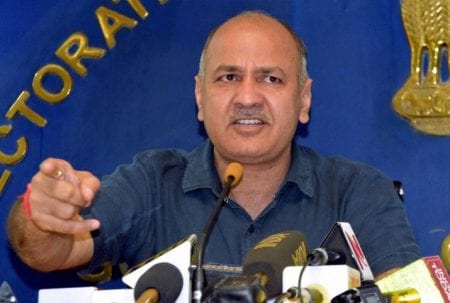
How probe agencies built their case against Manish Sisodia
The new policy ran into trouble with the Chief Secretary of the Delhi Government claiming it offered unwarranted favours.

The arrest of Delhi Deputy Chief Minister Manish Sisodia in connection with the Delhi liquor sales policy was only a matter of time. Various investigating agencies had reported that the Aam Aadmi Party’s (AAP) policy had caused a revenue loss of nearly ₹3,000 crore to the government exchequer and was intended to generate illegal money for the party’s coffers.
The investigation pertains to the cancelled liquor sales policy for Delhi that was introduced in 2021. In addition to serving as Deputy CM and Finance Minister of finance in the Arvind Kejriwal government in Delhi, Sisodia was also in charge of the excise department.
LIVE: Manish Sisodia reaches CBI court as nationwide AAP protests continue
In contrast to the conventions of the majority of states, Delhi’s alcohol policy forbade government involvement in the sale of alcohol and enabled only private firms to do so. The primary objectives were eliminating black marketing, increasing sales, and improving the customer experience.
Revenue jump
It also permitted businesses to remain open until 3 am for home delivery of alcoholic beverages. Also, licensees might offer unlimited discounts. The strategy earned about ₹8,900 crore in government revenue, a huge increase of 27 per cent. According to an ICICI Securities analyst report, the policy’s highlights include the installation of new liquor vending machines with at least 500 sq ft of space, a walk-in facility, and air conditioning and CCTV cameras.
It also permitted five 2,500-sq-ft super-premium retail vending machines and a liquor tasting facility. Moreover, the city was divided into 32 zones for improved management. According to ICICI Securities analysts, the alcobev (alcoholic beverage) category was expected to gain fresh growth legs due to the new legislation.
The report said that if sustained, the new distribution strategy (online ordering and home delivery) can be a structural boon for the sector.
Unearthing a ‘scam’
However, the new policy 2021-22 ran into trouble with the Chief Secretary of the Delhi government claiming it was used to offer unwarranted financial favours to the holders of liquor licences long after the contracts were awarded, resulting in considerable losses to the exchequer. According to a report from Chief Secretary of Delhi Naresh Kumar dated July 8, 2022, there were prima facie violations of the GNCTD (The Government of National Territory of Delhi) Act, 1991, Transaction of Business Regulations (ToBR), 1993, Delhi Excise Act, 2009, and Delhi Excise Rules, 2010.
Newsmaker: Manish Sisodia: The deputy more often in news than his leader
According to media reports, on the recommendation of the Delhi Chief Secretary, Delhi Lieutenant Governor VK Saxena ordered an investigation into the disputed Delhi Excise Policy 2021-22 of the Kejriwal-led administration. On July 22, 2022, Saxena proposed that the CBI investigate suspected procedural flaws and rule infractions in the administration of the excise policy.
The report of the Delhi Chief Secretary also said Sisodia, the minister in charge of the excise department, “made and got implemented significant decisions/actions” that were “in contravention of the statutory provisions and the notified excise policy” and had “huge financial ramifications”.
Shortly thereafter, Sisodia announced that the restriction will be repealed because, as he claimed, the BJP was threatening sellers through the investigative agencies it controls. He also blamed the failure of the reforms on Saxena’s predecessor, Anil Baijal, due to a “last-minute amendment”.
The chargesheet
Before his arrest on Sunday (February 26), Sisodia was not included in the agency’s chargesheet. Despite this, the CBI conducted 31 searches at his residence last year. The minister stated that the agency had made no incriminating discoveries, and the agency did not contest this allegation.
Money laundering allegations
Separately, the Enforcement Directorate (ED) examined allegations of money laundering in the Delhi liquor controversy. It said a liquor lobby known as the “South Group” paid the AAP at least ₹100 crore in kickbacks for its Goa election campaign via one of the jailed businessmen.
Watch | Modi believes in Raid and Rule: BRS leader K Kavitha
The ED widened the scope of the inquiry by detaining K Kavitha, the daughter of Telangana Chief Minister K Chandrashekhar Rao and another prominent BJP opponent. The AAP has categorically disputed all charges and asserted that the 2021-22 liquor policy was “the greatest and most open policy in the nation”.
The ED chargesheet stated that the legislation obliged manufacturers to pick a single L1 wholesaler as their only distributor. According to the terms and conditions of the L1 wholesalers, any competent applicant might apply for the licence granted on an application-by-application basis.
Yet, the investigation revealed that an AAP official coerced a multinational alcohol distributor to give its wholesale distribution business to one of the defendants in the case. Once the fraud was alleged, digital evidence was destroyed, or digital devices were manipulated, according to the ED investigation.
Following the indictment, several suspects, including liquor barons, high-ranking government officials, Sisodia, and other accused parties, frequently changed their phones, it is said. The utilised and destroyed devices are valued at around ₹1.38 crore.
Bribery charges
Kavitha and other members of the South Group, the probe report claimed, paid bribes in advance to AAP leaders. In exchange for unfettered access, special treatment, ownership stakes in established wholesale enterprises, and access to several retail zones, the organisation reportedly received payments (beyond what was allowed in the policy).
According to media reports, the chargesheet stated that AAP’s liquor policy encouraged cartelisation through covert transactions. It was also alleged that the policy was leaked to select distributors and producers of alcoholic beverages before its official release and that excise officers issued several licences after hours.
Following the allegations, the Delhi Government rescinded the Delhi Excise Policy 2021–22.

